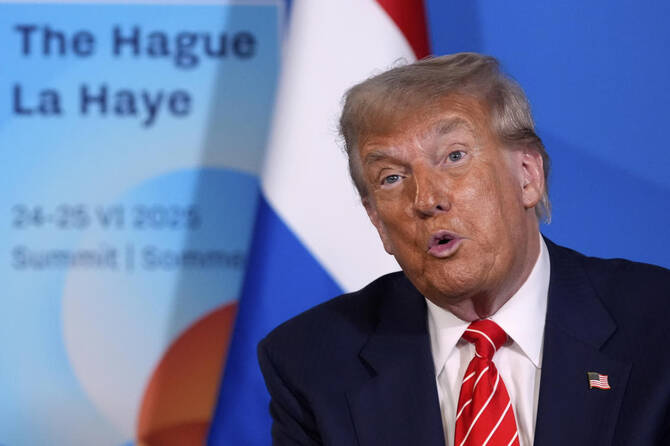
- ARAB NEWS
- 14 Aug 2025

THE HAGUE/TEL AVIV/ISTANBUL: US President Donald Trump reveled in the swift end to war between Iran and Israel, saying he now expected a relationship with Tehran that would preclude rebuilding its nuclear program despite uncertainty over damage inflicted by US strikes.
As exhausted and anxious Iranians and Israelis both sought to resume normal life after the most intense confrontation ever between the two foes, Iran’s president suggested that the war could lead to reforms at home.
Trump, speaking in The Hague where he attended a NATO summit on Wednesday, said his decision to join Israel’s attacks by targeting Iranian nuclear sites with huge bunker-busting bombs had ended the war, calling it “a victory for everybody.”
He shrugged off an initial assessment by the US Defense Intelligence Agency that Iran’s path to building a nuclear weapon may have been set back only by months, saying the findings were “inconclusive” and he believed the sites had been destroyed.
“It was very severe. It was obliteration,” he said.
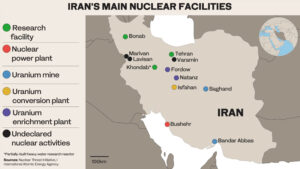
He was confident Tehran would not try to rebuild its nuclear sites and would instead pursue a diplomatic path toward reconciliation, he said.
“I’ll tell you, the last thing they want to do is enrich anything right now. They want to recover,” he said.
If Iran tried to rebuild its nuclear program, “We won’t let that happen. Number one, militarily we won’t,” he said, adding that he thought “we’ll end up having something of a relationship with Iran” to resolve the issue.
Israel’s bombing campaign, launched with a surprise attack on June 13, wiped out the top echelon of Iran’s military leadership and killed its leading nuclear scientists. Iran responded with missiles that pierced Israel’s defenses in large numbers for the first time.
Iranian authorities said 610 people were killed and nearly 5,000 injured in Iran, where the extent of the damage could not be independently confirmed because of tight restrictions on media. Twenty-eight people were killed in Israel.
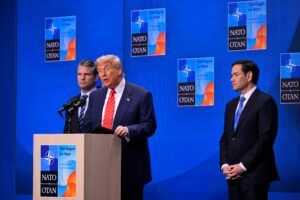
Both Iran and Israel declared victory: Israel claiming to have achieved its goals of destroying Iran’s nuclear sites and missiles, and Iran claiming to have forced the end of the war by penetrating Israeli defenses with its retaliation.
But Israel’s demonstration that it could target Iran’s senior leadership seemingly at will poses perhaps the biggest challenge ever for Iran’s clerical rulers, at a critical juncture when they must find a successor for Supreme Leader Ali Khamenei, now 86 and in power for 36 years.
President Masoud Pezeshkian, a relative moderate elected last year in a challenge to years of dominance by hard-liners, said the atmosphere of national solidarity during the Israeli attacks would spur domestic reform.
“This war and the empathy that it fostered between the people and officials is an opportunity to change the outlook of management and the behavior of officials so that they can create unity,” he said in a statement carried by state media.
Still, Iran’s authorities moved swiftly to demonstrate their control. The judiciary announced the execution of three men on Wednesday convicted of collaborating with Israel’s Mossad spy agency and smuggling equipment used in an assassination. Iran had arrested 700 people accused of ties with Israel during the conflict, the state-affiliated Nournews reported.
During the war, both Netanyahu and Trump publicly suggested that it could end with the toppling of Iran’s entire system of clerical rule, established in its 1979 revolution.
But after the ceasefire, Trump said he did not want to see “regime change” in Iran, which he said would bring chaos at a time when he wanted the situation to settle down.
A rapprochement between Tehran and the West would still require a deal governing Iran’s long-term nuclear ambitions in return for lifting US and international sanctions. Iran has always denied seeking an atomic weapon, which Western countries have accused it of pursuing for decades.
The head of the UN’s IAEA nuclear watchdog, Rafael Grossi, said his top priority was ensuring international inspectors could return to Iran’s nuclear sites, dismissing what he called the “hourglass approach” of trying to assess the damage in terms of the months it would take Iran to rebuild.
“In any case, the technological knowledge is there and the industrial capacity is there. That, no one can deny. So we need to work together with them,” he said.
Trump’s Middle East envoy, Steve Witkoff, said late on Tuesday that talks between the United States and Iran were “promising” and Washington was hopeful for “a long-term peace agreement that resurrects Iran.”
Iran’s parliament approved a bill on Wednesday to suspend cooperation with the IAEA, state-affiliated news outlet Nournews reported, though it said such a move would require approval of Iran’s top security body.
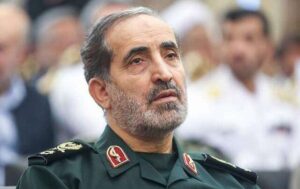
Iranian military chief Shadmani dies of wounds from Israeli strikes
The head of Iran’s Revolutionary Guards command center, Ali Shadmani, died of wounds sustained during Israel’s military strikes on the country, Iranian state media said on Wednesday.
Israel’s armed forces had said on June 17 that it killed Shadmani, who it identified as Iran’s wartime chief of staff and most senior military commander.

Trump says US and Iranian officials will talk next week
US President Donald Trump asserted on Wednesday that US and Iranian officials will talk next week, giving rise to cautious hope for longer-term peace even as Tehran insisted it will not give up its nuclear program.
Trump, who helped negotiate the ceasefire that took hold Tuesday on the 12th day of the war, told reporters at a NATO summit that he wasn’t particularly interested in restarting negotiations with Iran, insisting that US strikes had destroyed its nuclear program. Earlier in the day, an Iranian official questioned whether the United States could be trusted after its weekend attack.
“We may sign an agreement, I don’t know,” Trump said. “The way I look at it, they fought, the war is done.”
Iran has not acknowledged any talks taking place next week, though US Mideast envoy Steve Witkoff has said there has been direct and indirect communication between the countries.
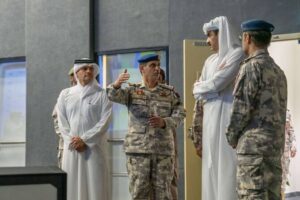
Qatari emir briefed on Iranian missile interception
Qatari Emir Sheikh Tamim bin Hamad Al-Thani visited the Joint Operations Command of the armed forces in the Al-Mazrouah area on Wednesday.
Sheikh Tamim toured the headquarters to review the systems utilized for monitoring as well as command and control, Qatar News Agency reported.
During the visit, a briefing was provided regarding the interception of a missile attack targeting Al-Udeid Air Base, which the Iranian Revolutionary Guard Corps launched on Monday evening.
The Joint Operations Command highlighted the precautionary measures implemented by the armed forces, emphasizing their efficiency and readiness to defend Qatar.
Israel killed at least 14 scientists in attack on Iran’s nuclear know-how
Israel’s tally of the war damage it wrought on Iran includes the targeted killings of at least 14 scientists, an unprecedented attack on the brains behind Iran’s nuclear program that outside experts say can only set it back, not stop it.
In an interview with The Associated Press, Israel’s ambassador to France said the killings will make it “almost” impossible for Iran to build weapons from whatever nuclear infrastructure and material may have survived nearly two weeks of Israeli airstrikes and massive bunker-busting bombs dropped by US stealth bombers.
“The fact that the whole group disappeared is basically throwing back the program by a number of years, by quite a number of years,” Ambassador Joshua Zarka said.
But nuclear analysts say Iran has other scientists who can take their place.
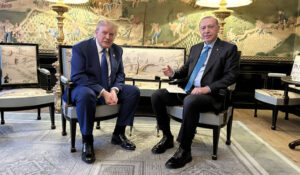
Meeting Trump, Turkiye’s Erdogan hails Iran-Israel truce
Turkiye’s Recep Tayyip Erdogan hailed the Iran-Israel ceasefire and urged “close dialogue” to end the Russia-Ukraine conflict, as he held talks with US President Donald Trump on the sidelines of a NATO summit late Tuesday.
The Turkish president “expressed his satisfaction with the ceasefire achieved between Israel and Iran through President Trump’s efforts, hoping it would be permanent,” his office said.
Erdogan also stressed the need for Ankara and Washington to work closely to end the war in Gaza and the Russia-Ukraine conflict.
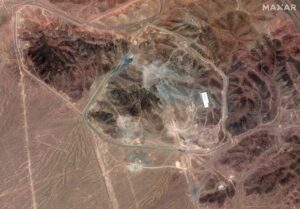
Netanyahu claims Iran will not have a nuclear weapon
Israeli Prime Minister Benjamin Netanyahu declared a “historic victory” against Iran despite a US intelligence report concluding that American strikes set back Tehran’s nuclear program by just a few months.
In an address to the nation after the ceasefire announcement, Netanyahu said “Iran will not have a nuclear weapon.”
“We have thwarted Iran’s nuclear project,” he said. “And if anyone in Iran tries to rebuild it, we will act with the same determination, with the same intensity, to foil any attempt.”
Israel had said its bombing campaign, which began on June 13, was aimed at preventing Iran from acquiring a nuclear weapon, an ambition Tehran has consistently denied.
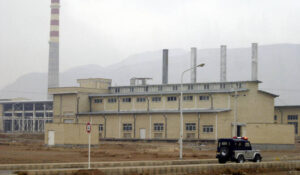
US intel says strikes did not destroy Iran nuclear program
A classified preliminary US intelligence report has concluded that American strikes on Iran set back Tehran’s nuclear program by just a few months — rather than destroying it as claimed by President Donald Trump.
US media on Tuesday cited people familiar with the Defense Intelligence Agency findings as saying the weekend strikes did not fully eliminate Iran’s centrifuges or stockpile of enriched uranium.
The strikes sealed off entrances to some facilities without destroying underground buildings, according to the report.
White House Press Secretary Karline Leavitt confirmed the authenticity of the assessment but said it was “flat-out wrong and was classified as ‘top secret’ but was still leaked.”
Reuters